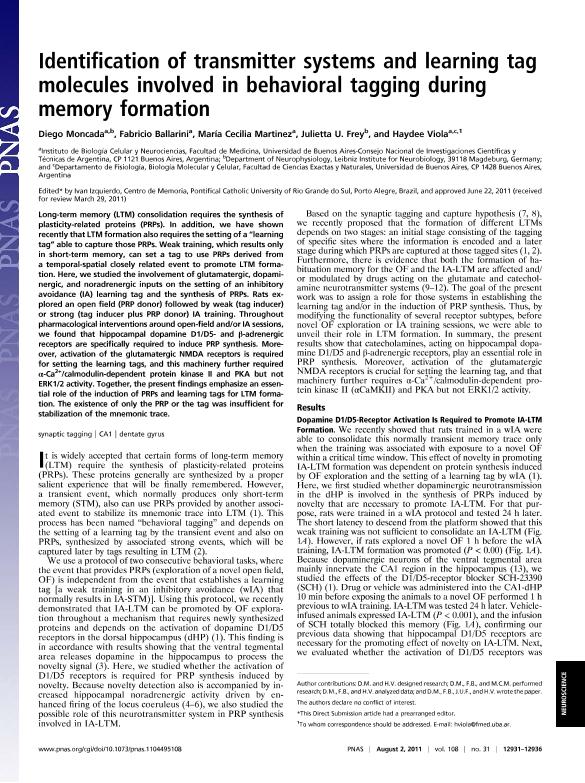Artículo
Identification of transmitter systems and learning tag molecules involved in behavioral tagging during memory formation
Moncada, Diego ; Ballarini, Fabricio Matias
; Ballarini, Fabricio Matias ; Martínez, María Cecilia
; Martínez, María Cecilia ; Frey, Julietta U.; Viola, Haydee Ana Maria
; Frey, Julietta U.; Viola, Haydee Ana Maria
 ; Ballarini, Fabricio Matias
; Ballarini, Fabricio Matias ; Martínez, María Cecilia
; Martínez, María Cecilia ; Frey, Julietta U.; Viola, Haydee Ana Maria
; Frey, Julietta U.; Viola, Haydee Ana Maria
Fecha de publicación:
08/2011
Editorial:
National Academy of Sciences
Revista:
Proceedings of the National Academy of Sciences of The United States of America
ISSN:
0027-8424
Idioma:
Inglés
Tipo de recurso:
Artículo publicado
Clasificación temática:
Resumen
Long-term memory (LTM) consolidation requires the synthesis of plasticity-related proteins (PRPs). In addition, we have shown recently that LTM formation also requires the setting of a "learning tag" able to capture those PRPs. Weak training, which results only in short-term memory, can set a tag to use PRPs derived from a temporal-spatial closely related event to promote LTM formation. Here, we studied the involvement of glutamatergic, dopaminergic, and noradrenergic inputs on the setting of an inhibitory avoidance (IA) learning tag and the synthesis of PRPs. Rats explored an open field (PRP donor) followed by weak (tag inducer) or strong (tag inducer plus PRP donor) IA training. Throughout pharmacological interventions around open-field and/or IA sessions, we found that hippocampal dopamine D1/D5- and β-adrenergic receptors are specifically required to induce PRP synthesis. Moreover, activation of the glutamatergic NMDA receptors is required for setting the learning tags, and this machinery further required α-Ca 2+/calmodulin-dependent protein kinase II and PKA but not ERK1/2 activity. Together, the present findings emphasize an essential role of the induction of PRPs and learning tags for LTM formation. The existence of only the PRP or the tag was insufficient for stabilization of the mnemonic trace.
Palabras clave:
Ca1
,
Dentate Gyrus
,
Synaptic Tagging
Archivos asociados
Licencia
Identificadores
Colecciones
Articulos(IBCN)
Articulos de INST.DE BIOLO.CEL.Y NEURCS."PROF.E.DE ROBERTIS"
Articulos de INST.DE BIOLO.CEL.Y NEURCS."PROF.E.DE ROBERTIS"
Articulos(SEDE CENTRAL)
Articulos de SEDE CENTRAL
Articulos de SEDE CENTRAL
Citación
Moncada, Diego; Ballarini, Fabricio Matias; Martínez, María Cecilia; Frey, Julietta U.; Viola, Haydee Ana Maria; Identification of transmitter systems and learning tag molecules involved in behavioral tagging during memory formation; National Academy of Sciences; Proceedings of the National Academy of Sciences of The United States of America; 108; 31; 8-2011; 12931-12936
Compartir
Altmétricas



